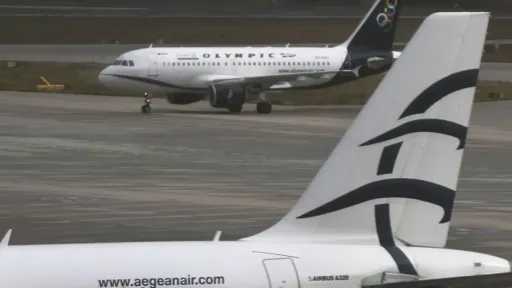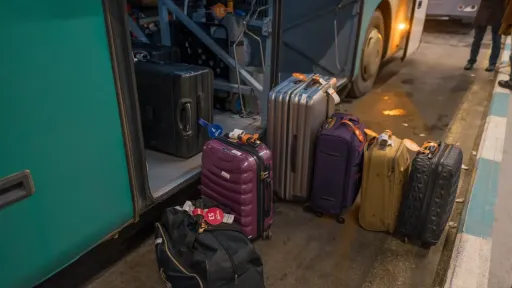Turkish child saved by Greek stem cell donor reunites in Athens

A Turkish boy who received a life-saving stem cell transplant met his Greek donor in Athens, marking a heartwarming moment of cross-border unity.
The reunion, which took place two years after the transplant, featured 4-year-old Cagatay, who traveled from Türkiye with his family to meet Alexandros Apostoloudas, the Greek donor who helped save his life.
Life saved in Athens
The event was organized as part of a promotional campaign for stem cell donation in Athens, where Cagatay, now in good health, finally met his donor for the first time. Due to international regulations, patients and donors are required to wait two years before meeting.
Cagatay’s family made the journey to Greece’s capital after Apostoloudas expressed his wish to meet the boy whose life he had saved. Türkiye’s Ambassador to Athens Cagatay Erciyes along with Greece’s government spokesman Pavlos Marinakis and former Prime Minister Lukas Papadimos, were also present at the event.
Connecting past and present
For Cagatay’s family, the occasion held a deeper meaning. Cagatay’s grandfather had moved from Drama, Greece, to Türkiye during the population exchange between the two nations nearly a century ago. Speaking to Anadolu Agency (AA), Cagatay’s father, Cihan Dramali, shared how their family history is intertwined with Greece.
“My grandfather’s mother arrived in Bandirma by ship and gave birth to him as soon as she disembarked. That’s why our surname is Dramali. We have ties with Greece, and we’re happy to be back here. When we heard the news, we were overjoyed. My father was too. They asked us to share our story with the donor.” Dramali expressed his desire to continue the friendship with Apostoloudas and to host him in Türkiye, saying, “He is like a brother to us.”
Mother’s gratitude
Cagatay’s mother, Hande Dramali, shared their struggles after learning their son was born with chronic granulomatous disease (CGD), a rare genetic immune system disorder. She described the initial stem cell transplant attempt using a match from Cagatay’s father, which failed. Fortunately, Apostoloudas’ stem cells turned out to be a 90% match, and the second transplant was successful.
“This is something sacred. Every healthy person should consider donating. There are many people in need. We were lucky, but others might not be. We were extremely worried; even though we had a donor, we feared he might not come through. If we hadn’t found a match, we would have been in a very difficult situation. We are overjoyed,” she said.
Cagatay’s older brother, seven-year-old Cinar Dramali, expressed his happiness at being able to play with his little brother again. “I am very happy that we can play together now. I want to swim in the sea with him,” Cinar shared.
Donor’s joy
Apostoloudas, the donor, expressed that he was just as happy as Cagatay’s family. He recalled giving his first blood sample in 2010 in his hometown of Edessa, hoping to help a patient in need.
Eight and a half years later, he was informed that his stem cells were a match for Cagatay. “I can’t put my feelings into words. It’s overwhelming,” he said, adding that the reunion was an emotional experience for him.
‘Building bridges of life’
Former Greek Prime Minister Lukas Papadimos highlighted the significance of the event’s theme, “Building bridges of life,” emphasizing the importance of such initiatives.
“These events save lives, both children and adults, without borders. It was a deeply emotional and informative event. The most touching moment was seeing the Greek donor and Turkish boy together on stage. It’s a powerful reminder that humanity can overcome borders to help each other,” said Papadimos, expressing gratitude to the organizations that made the event possible.
Role of cross-border transplants
Gamze Ceylan, the International Donor Screening Coordinator at Ankara University (AU) Family-Independent Tissue and Cord Blood Bank (TRAN), shared that when Cagatay’s case was submitted, the global donor database had around 40 million potential donors, but the best match was found in Greece.
“We collected the stem cells in Greece, and the transplant was performed at AU’s pediatric department,” she said. Ceylan further explained how the reunion was arranged at the donor’s request, adding, “We are thrilled. Donating stem cells is a noble act; you are making a great sacrifice for someone you’ve never met.”
Saving lives across borders
Professor Selami Kocak Toprak, head of the Hematology Department at AU and TRAN’s chief, said their system can find matches from around the world within a day if no match is available within Türkiye.
“We cooperate with tissue banks across the globe, regardless of political issues between countries. We can find suitable donors from even the most remote parts of the world,” he said. Despite the challenges posed by the COVID-19 pandemic, TRAN facilitated around 90 stem cell transplants.
“Stem cell donation is a life-saving procedure. I encourage everyone to consider becoming a volunteer donor,” he said.
‘Donors should not be afraid to donate’
Yasin Yildirim, head of the Therapeutic Apheresis Center at AU, emphasized the simplicity and safety of the stem cell donation process, comparing it to blood donation.
“We administer a small injection under the skin for three to four days, tailored to the donor’s weight. This injection encourages the stem cells to move from the bone marrow to the bloodstream, where they can be easily collected. It’s a simple, harmless procedure with no side effects. Donors should not be afraid; it’s as easy as donating blood,” he explained.
Yildirim added that stem cells can be transported across the world using liquid nitrogen, ensuring they reach those in need without any complications.
The heartwarming reunion between little Cagatay and his stem cell donor Aleksandros Apostoludas highlights the power of cross-border cooperation and human compassion. Their story demonstrates how stem cell donations can bridge nations, cultures and even past divides, offering hope and a new lease on life for those in need.
The emotional encounter underscores the importance of stem cell donation and inspires many to consider becoming donors, emphasizing that simple acts of kindness can lead to life-changing miracles.
ΑΑ







